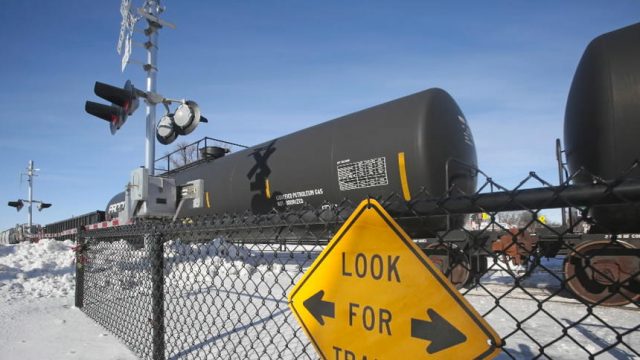Congrats #NoDAPL: Thanks to Dakota Access Delays More Oil to Be Shipped by Train

“You can’t drink oil, keep it in the soil.”
That’s been one of the chants used most often by #NoDAPL protesters, and it undermines the idea that the protesters are just out to protect the Standing Rock Sioux tribe’s water. A faction of the protesters, if not all of them, don’t merely want a safer route for the pipeline. They want no pipeline at all, and no oil production at all, because they adhere to a very extreme point of view on environmental issues.
They expect us to stop producing oil even as every single one of us – including the protesters themselves – use oil every day.
Adding to that absurdity is this reality: Stopping pipelines does not stop oil production.
What it does is force the oil to flow to market through other means.
Like rail. This report from Reuters is an inconvenient truth for the anti-pipeline movement:
The Dec. 4 decision by U.S. Army Corps of Engineers to deny Energy Transfer Partners an easement to complete the line means shippers who expected to see another 570,000 barrels of daily Bakken pipeline capacity in 2017 will have to find new ways to move supply.
Rail comprises nearly 65 percent of total crude export capacity in the Bakken, but is currently underutilized because it is more costly and less efficient. In September, only 29 percent of total Bakken oil production moved by rail, according to the latest figures from the North Dakota Pipeline Authority.
“Once the pipes are full, that means more trains. And without DAPL, the pipes get full sooner than they otherwise would have,” said Rick Smead, managing director of advisory services for RBN Energy, noting that this scenario is contingent on a big rise in production.
Rail is a perfectly acceptable way to ship oil. Rail capacity is an important part of North Dakota’s industrial infrastructure, no doubt. But rail is not the optimal way to transport oil. Pipelines are both cheaper and safer.
By blocking pipelines these protesters are forcing oil to be transported on rail, which is not as safe. That seems counterproductive to their goals, doesn’t it?
And consider this: If protesters make it impossible to build new pipelines, with new techniques and materials and technology, that makes it less likely that old pipelines built with older methods/materials/techniques will be retired. Industry will want to hold on to that capacity because they can’t build new capacity.
The environmental zealots would tell us that we should just switch from oil to green energy, and while I’m not against that transition per se, if we forced the issue it would require a sacrifice to our standard of living that most Americans simply aren’t ready to make yet.
So the reasonable conclusion is that we should responsibly build safe infrastructure to transport a product we all need to keep using.
Not that many in the #NoDAPL movement are capable of being reasonable.




